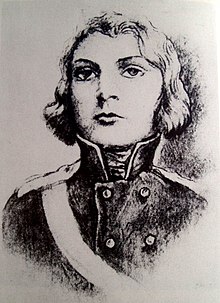Eleonore Prochaska
| Eleonore Prochaska | |
|---|---|
 |
|
| Birth name | Marie Christiane Eleonore Prochaska |
| Other name(s) | August Renz |
| Born | 11 March 1785 |
| Died | 5 October 1813 (aged 28) |
| Allegiance |
|
| Service/branch | Army |
| Years of service | 1813 |
| Unit | Lützow Free Corps |
| Battles/wars | Napoleonic Wars |
Marie Christiane Eleonore Prochaska (11 March 1785 in Potsdam – 5 October 1813 in Dannenberg) was a German woman soldier who fought in the Prussian army against Napoleon during the War of the Sixth Coalition.
Eleonore's father was NCO in the Prussian guards, on a low income. She grew up poor and was sent by her father to the military orphanage in Potsdam when her mother died. There she later found work as a domestic servant, though she was also interested in the war against Napoleon from an early age.
During these wars she disguised herself as a man and registered for 1 Jägerbataillon of the Lützow Free Corps under the name August Renz in 1813, serving first as a drummer, then later as an infantryman. She was severely wounded at the Battle of the Göhrde and field-surgeons, rushing to treat her wounds, discovered she was a woman and took her to Dannenberg, where she succumbed to her wounds three weeks later.
In retrospect, she was strongly idealized as a chaste heroine and honoured as "Potsdam's Joan of Arc" ("die Potsdamer Jeanne d'Arc"). Various plays and poems were written on her life (including those by Friedrich Rückert and Emil Taubert), whilst Ludwig van Beethoven began a "Bühnenmusik" (WoO 96) on her, with a libretto written by Friedrich Duncker.
In 1863, a commemorative marker was erected over her grave at St.-Annen-Friedhof in Danneburg and in 1889 her home town of Potsdam created a monument to her memory ("Der Heldenjungfrau zum Gedächtnis", or "In memory of the maiden-heroine"), which still survives in the almost completely cleared Alten Friedhof (old cemetery).
Ludwig van Beethoven composed incidental music for a play by Johann Friedrich Duncker about the military heroine, entitled Leonore Prohaska. Duncker was Cabinet Secretary for the King of Prussia whom he accompanied to the Congress of Vienna. Despite Duncker's hopes, Leonore Prohaska was not performed in Vienna which may have been due to the fact that the material had already been treated in Piwald's Das Mädchen von Potsdam which did see performance in 1814.
...
Wikipedia
